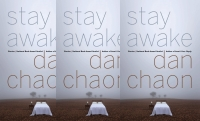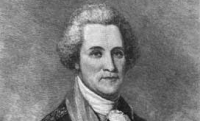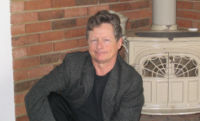Featured Writer
1. Your piece in this issue of Emprise is a gorgeous, sad story, told in an unusual way and yet all the more compelling because of the form. The form here gels so well with the story itself: using film as the medium because it can be edited, can be cut and reshot and we wish the same for the terrible thing we know has happened. I know you play around with form and structure a lot in your work. How do you decide which forms or narrative structures to use? Does a typical Matt Bell story go through many different forms before you get the ‘click’, before the story and the form truly complement one another?
For me, structure and form are most important in the way that they are inextricably married to voice: Find the structure, and the voice comes along, more often than not, or vice versa, and it’s the voice that I have to get right before I can proceed too far. My “Index of How Our Family is Killed,” for instance, brought with it a certain kind of voice that seemed right for its form, and from that voice came the story of the murdered family, which I hadn’t even the slightest idea about when I started writing—It was form, then voice, then plot.
More specific to your question, maybe: “Ten Scenes from a Movie Called Mercy” never had any other form, other than a few minor differences, like roman numerals between sections in its first printing (in No Colony). I started with the image of the man approaching across three different locations, and I think that created the need for fragments that spawned the final structure. The sections were written out of order, and I had written a good number before I realized it was a movie I was describing. In many ways, that’s my favorite way to write: no outline or plan, no net below the tightrope. Better to inch my way forward, feeling for the story ahead. That way I’m surprised too, and the writing is just as much an experience as the reading hopefully will be.
Other stories in my collection went through lots of forms and voices, or points of view, which is really what form and voice are. Still, I rarely—maybe never—get a full draft in the wrong point of view. By the time I’m a couple pages in, it’ll be clear the voice isn’t working, that it doesn’t contain enough of whatever it is that makes stories go. I’ll start over, try something else, try to hear it right, and hopefully I’ll figure it out. That doesn’t always happen, of course, but enough that it’s usually worth going back and trying again and again, looking for the right way to write about whatever set me in motion in the first place.
2. I love that your stories are so varied in subject matter, in viewpoint, in tone—and yet, for me anyway, the unifying characteristic is this intense compassion for human suffering and weakness. Where do you find the ideas for your stories? Do you pull from life, from your reading, from art, from movies, from music—where does the variation come from? Are there any recurring themes you see in your writing? Any patterns?
I think anything and everything can be enough for a story. It doesn’t take much to make one go. In How They Were Found, stories were started from bits of language, from images, from historical stories, from fairy tales, from genre tropes. One was a dream before it was a story—which should not, cannot work, but yet thankfully did—and one came from wanting to focus in on a particular part of the body over and over, as often as I could in a story, to see what that did. A curiosity, then, and that might be the best way to describe the beginnings of most of my stories: I get curious, and then I get obsessed, and then I am off and writing. That’s really all it takes.
I’m a very obsessive person, and my obsessions show in my work, both in the makeup of many of my characters—who might as a group be defined by their ability to never let anything go, as perhaps they should—and in the themes of many of my stories, especially those in How They Were Found. It’s an obsessive book, both in its characters and its plots. I’m interested also in how people take on roles—how they pick stories to tell themselves about who they are—and the effects those choices have on them. A lot of the stories in HTWF start with the character assuming some new role—detective, cartographer, ex-girlfriend, whatever—and then follow their completion or else exhaustion of that role. That’s still a kind of obsession, although maybe in the opposite sense. Instead of holding on, as we try to change who we are we are also trying to forget who we used to be.
3. You need/want to write a story. How does the process work for you? Do you have a place, a time, or a method, or does a story need to find its way into your head first before you put pen to paper? How often do you write? Do you ever use prompts? Or is it different for you every time?
I write almost every day, generally in the morning, from about nine until noon. I generally write in my office, in my house, although if I’m forced into some other space by work or by travel, I can make do. I don’t generally use prompts, except in the way that having a scheduled time and place is a prompt: I sit down at the computer every day, and I work my three hours or so, and I do this for enough days in a row that it produces a fiction, and then the next day I sit down at the blank screen and start over again. I rarely have real ideas: I usually just start typing, and see what happens, what’s interesting, what’s worth pursuing. Writing every day has given me the faith that, if I stay in the chair and keep trying, something will happen. It might not be what I expected—it might be better if it is not—but something will come, and that thing will be enough to get through the day, and maybe to produce something worthwhile, given enough days.
4. Who are your influences when you write? Writers, musicians, painters, poets, doctors, teachers, athletes, family, friends—who, living or dead, imaginary or real, has shaped your work in a big way?
Just talking writers: Sam Lipsyte was a big early influence on me, as well as Matthew Derby, Denis Johnson, Raymond Carver, Aimee Bender, George Saunders, James Tate, Etgar Keret, Ben Marcus, Amy Hempel, and so on. In the past few years, it was Brian Evenson, Cormac McCarthy, Norman Lock, Robert Lopez, Christine Schutt, Michael Kimball, Laird Hunt, and many, many others. But the word “influence” has come to mean different things for me over time: In years past, it would mean “a person I wanted to write like.” Now, I’m trying not to write like anyone but myself, and to not solve problems the way these others would. I don’t want to tell their stories, but mine, and so an “influence” is less about who I want to write like and more about whose work thrills me, makes me fall in love with it. That’s the work that emboldens me, that makes me push myself after the same greatness that makes not just my writing but also my life better. Those are my influences now: The writers I love, that I believe in, because of the greatness they put into their work upon the page.
5. If you were allowed to bring three books onto the proverbial desert island, what books would you bring?
There’s no way I’d survive with only three books. Can I bring my Kindle, my iPad, and a copy of Jesus’ Son?
6. What contemporary writers are you most excited about, and why?
“Contemporary” is a funny word, isn’t it? It’s easy to pick immediately all the younger writers I listed above, and also add a few more names that I’m incredibly excited about, like Amelia Gray, Eugene Marten, Tina May Hall, Blake Butler, and so many more I could list. That would all be accurate, of course, as those are all writers I’m incredibly excited by, and that I constantly expect great things from. What I’d be forgetting—what is so, so easy to forget—is that all the writers living today are also our contemporaries, that they’re writing in the same age as we are.
It’s a tough game out there, when at the same time I’m starting my first book, McCarthy’s finishing The Road. Tougher still that there’s going to come a year when he puts out a new book at the same time I do. How good will my book have to be to recommend it over his? It’s one more thing to push myself with, and something I think is easy for emerging writers to forget, amid the well-deserved accomplishments and excitements of our generation of writers that’s just starting to really show itself in the world. We’ve got to keep the bar high, keep trying to write bigger and better books. The people I listed above are among the many writers I think are trying to do that, and that’s why I find them as exciting as I do.
7. You have a book just out, How They Were Found, with Keyhole Press. Tell us why you love this book and why we should, too.
I love this book because I waited for the right time before I put it together. It wasn’t the first book I could have published, but the first book I should have. You should love this book because I worked hard to select and order it so that it would be a book, meant to be read from being to end, rather than a collection, which could be dipped in and out of, and it’s a better book for it. I love this book—and hope you will too—because I put into it as much of me as I then could, and in the writing of it found out there was much more I could give to the page—to the reader—and that if I just keep trying to give all of it there will be more and more rushing in to take its place.
8. Tell us how you would spend a perfect November Sunday.
At home, with my wife, without all the million things that keep us apart, even when we’re home together. We don’t get nearly enough days that are just us, all day long, and I could use another one soon.
–
Matt Bell is a Featured Writer in Emprise 17. Read “Ten Scenes From A Movie Called Mercy“
Interviewed by Amber Sparks








Pingback: November’s Emprise Review is Large and In Charge (and now Live!) « Amber Sparks